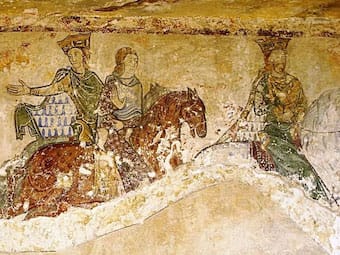1459
Alice experiences for herself the very definition of a pointless exercise.
Alice and an assortment of animals have got very wet. A mouse tries to dry them out by reciting a passage from a dry history book, but when this doesn’t work, the Dodo suggests a Caucus Race.
Picture: From the Library of Congress, via Wikimedia Commons. Licence: Public domain.. Source.
Posted January 3 2016
1460
The great-grandson of William the Conqueror, whose knights assassinated Thomas Becket and whose family harried him to an early grave.
Henry II was the grandson of Henry I and the great-grandson of William the Conqueror, and spent much of his life in the French estates he inherited from them. Henry managed to restore order to a country torn apart by almost thirty years of civil war, but is remembered today chiefly for a bitter dispute with Thomas Becket, Archbishop of Canterbury.
Picture: © Chinpat, Wikimedia Commons. Licence: CC BY-SA 3.0.. Source.
Posted January 3 2016
1461
The cup of happiness is dashed from Jane Eyre’s lips.
Mr Rochester has proposed to his astonished but delighted governess, Jane Eyre, and the happy couple are now in church, ready to exchange their marriage vows.
Picture: © David Pickersgill, Geograph. Licence: CC-BY-SA 2.0.. Source.
Posted January 3 2016
1462
The people of Lilliput are strangely small, but their ideas are bizarre in a big way.
Lemuel Gulliver has been carried on a strange journey to unknown peoples and cultures, which has now brought him to Lilliput, where the people are barely six inches high.
Picture: © Ray Stanton, Geograph. Licence: CC-BY-SA 2.0.. Source.
Posted January 3 2016
1463
Brutus tells Cassius to act while everything is going his way, or be left with nothing but regrets.
Brutus, Caesar’s assassin, is urging Cassius to march on Philippi to meet Octavius (Octavian) and Anthony in the struggle for power in Rome. Cassius is reluctant, but Brutus argues that it must be now or never.
Picture: © Tony Atkin, Geograph. Licence: CC-BY-SA 2.0.. Source.
Posted January 3 2016
1464
Persian star-gazers hasten to Israel for the birth of a royal heir, but find that King Herod has had his fill of them.
According to Pliny the Elder (23-79), a Roman contemporary of St Paul, ‘magi’ were believed to be followers of Zoroaster, interpreters of dreams, worshippers of the stars and secret knowledge, not to mention conjurors and charlatans.
Picture: © Zeynel Cebeci, Wikimedia Commons. Licence: CC-BY-SA 4.0.. Source.
Posted January 2 2016





